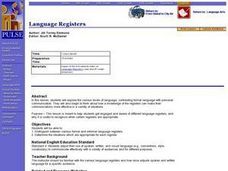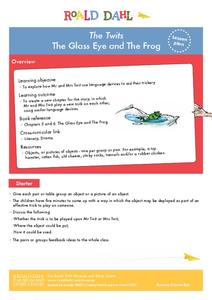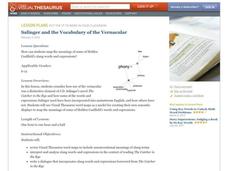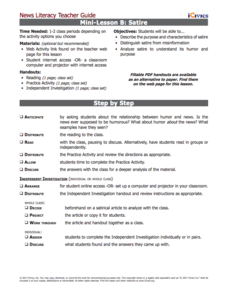One Stop English
A Lesson on Register
The classroom might not be the best place for informal language, but it's a great place to teach middle and high schoolers how to identify the correct language register for their audience. A short lesson on formal and informal language...
University of Arizona
Language Registers
Do you speak to your parents the same way you speak to your friends? The differences between formal and informal language are highlighted in this exercise. Groups are asked to select a scenario and script different dialogues that might...
Curated OER
Understanding language registers as a means to more effective communication
Students become familiar with registers of language through class discussion and exposure to examples of a common fairy tale written in two different registers. Working in small groups, students then translate a story into two different...
Curated OER
Diction: Formal and Informal Language
Coke or Pepsi? Is it the taste or the advertising that determines preference? As part of a study of diction, class members examine two passages, one formal and one informal, about Coca-Cola and Pepsi. In addition, they consider word...
Roald Dahl
Matilda - Miss Honey and The Trunchbull
As the instructor reads aloud several quotes from five chapters of the story Matilda, class members mime their interpretation of the scenes. Then, after reading "Miss Honey" and "The Trenchbull" (chapters seven and eight), the class...
Roald Dahl
The Twits - The Glass Eye and the Frog
What do a pair of stinky socks and a toy hamster have in common? The third lesson in an 11-part unit designed to accompany The Twits by Roald Dahl uses silly objects to teach about figurative language. Zany pranks and role play make for...
Curated OER
Matthew Henson
Discuss the work of Matthew Henson, an African American who traveled to the North Pole with Robert Peary. After reading the story "Matthew Henson" by Maryann N. Weidt, learners answer questions by drawing inferences and conclusions,...
Roald Dahl
Charlie and the Chocolate Factory
You can't read Roald Dahl's Charlie and the Chocolate Factory without craving the rich treats described in Dahl's vivid prose. Young writers try their hands at sensory language with a lesson plan that prompts them to write about their...
Curated OER
From Formal To Slang
Tenth graders define the term slang, explaining its various social, historical, and racial contexts, so as to articulate when it can be appropriately used as a means of effective communication. They use their own personal slang lexicon,...
Curated OER
Salinger and the Vocabulary of the Vernacular
Writers explore vocabulary and expressions used in the English language. They use visual word maps to become aware of the different uses of words which will allow them to more readily interpret texts. Then they listen to/read excerpts...
New Class Museum
Lesson: Emory Douglas: Decoding Images and Vocabulary Activity
To better understand the work of Black Panther logo artist Emory Douglas, learners define literary devices. They define a series of words such as metaphor, simile, and assonance, then place an example of that device found in Emory...
Roald Dahl
Matilda - Throwing the Hammer
Full truth, or an exaggeration? How can you tell when a storyteller is exaggerating a story? Readers analyze a story told by Hortensia, and identify the exaggerative language she uses. Then, learners write their own narrative story using...
Curated OER
Julie of the Wolves
Have your class practice their comprehension skills using this resource. After reading Julie of the Wolves by Jean Craighead George, learners engage in cause and effect activities, identify story elements and figurative language, and...
Curated OER
Knights of the Round Table adapted by Gwen Ross
Everyone loves the tales involving King Arthur and his knights. After reading Knights of the Round Table by Gwen Gross, learners draw inferences and conclusions, analyze story elements, and discuss figurative language, including...
Roald Dahl
The Twits - Dirty Beards
The problem with beards is that they collect a lot of food. The first lesson in an 11-part unit related to The Twits by Roald Dahl explores the hairy jungle that is Mr. Twit's beard. A concluding project has learners create their own...
Curated OER
Amelia Earhart
Your class can learn about Amelia Earhart and practice important comprehension skills here. Learners answer questions about cause and effect, compare texts, and discuss similes and metaphors after reading Amelia Earhart: Free in the...
Curated OER
Plagiarism: Avoiding Accidental Internet Plagiarism
Demonstrate how to cite information from Internet sources without plagiarizing. If your class is working on an Internet research paper, and you have observed learners cutting and pasting directly from the Internet, the activities and...
iCivics
Mini-Lesson B: Satire
Hey, what's so funny? Explore the use of satire in a variety of media with a hands-on lesson. Fourth in a five-part journalism series from iCivics, the activity introduces satirical language in print and online. Pupils work alone or in...
Curated OER
Letter Writing - Formal
Although rarely used these days, letter writing is still a form of writing reviewed in schools. After examining written letters, middle schoolers discuss characteristics of a formal letter and its parts. They choose a famous person to...
Teach Ling
Problem Solving with Turkish
Conquer those pesky moments when the Turkish language appears in class. Don’t be afraid to discover a few new Turkish morphemes, and their corresponding English words in this quick lesson. Who knows where this knowledge can go?
Beacon Learning Center
Beacon Lesson Plan Library: Formal or Informal?
Start talking trash with your elementary English class! Then lead a discussion comparing formal and informal language. Divide the class into groups to answer a questionnaire and analyze a set of sentence cards to analyze. This is a cool...
Curated OER
The Adder and the Ladder: Figurative Language as Persuasion in "Julius Caesar"
Students read and analyze figurative language used in William Shakespeare's "Julius Caesar." They participate in a choral reading of a soliloquy, analyze the soliloquy for figurative language in small groups, and discuss how the reading...
Curated OER
Discovering Shakespeare's Language through Sonnet 27
Students explore the language of Shakespeare. In this poetry lesson, students watch a video of illuminated images that accompany Sonnet 27. Students analyze the language of the poem and the image selections.
Curated OER
Communicative Choices & Linguistic Style
Start by watching a video entitled Do You Speak American? and respond to discussion questions about the various dialects showcased throughout the video to identify the regional linguistic styles throughout America. As a culminating...

























